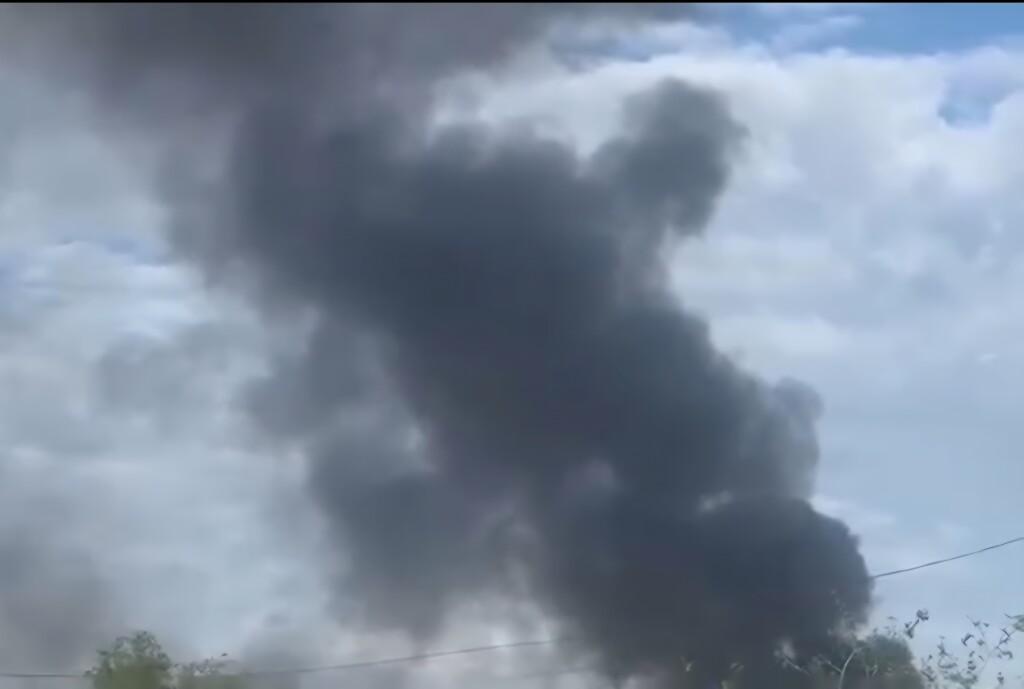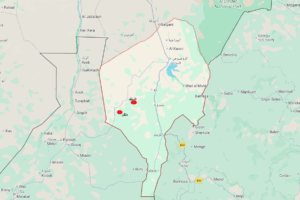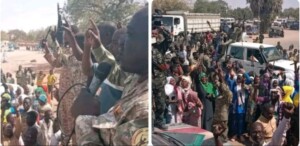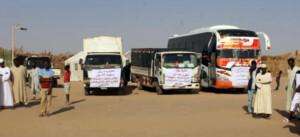El Fasher seige: Will airdops shift the balance of power in North Darfur?

A pall of smoke hangs over El Fasher after a bombing (Picture: Supplied via Socia Media)
The United Nations Office for the Coordination of Humanitarian Affairs (OCHA) in Sudan said that civilians trying to flee El Fasher are facing violence and looting along unsafe roads, while the armed forces have intensified artillery shelling and drone attacks following yesterday’s successful airdrop of supplies and military equipment. Military experts expect this to lead to a shift in the balance of power.
Denise Brown, OCHA’s Sudan Coordinator, said in a statement yesterday that the United Nations has received reports of extrajudicial killings, abductions, and arbitrary detention, as well as indiscriminate attacks on markets, hospitals, and places of worship.
She stressed the need to protect civilians under international humanitarian law and ensure safe passage for those wishing to leave the city. She added, “Exit routes must remain open, safe, and accessible. Civilians who remain also need protection, along with access to food, water, and other essential supplies.”
Lifting the siege of El Fasher
She called for the lifting of the siege of El Fasher, an end to indiscriminate attacks, and the issuance of clear orders to prevent sexual violence and ethnically motivated attacks, stressing that commanders and fighters are responsible for their actions under international law, which requires the protection of civilians.
The United Nations Office for the Coordination of Humanitarian Affairs (OCHA) said the humanitarian situation in El Fasher, North Darfur, is deteriorating by the day as the siege on the city intensifies.
OCHA stated that satellite imagery shows that the earthen berms surrounding the city now extend for more than 68 kilometres, reducing the remaining gap to just three or four kilometres, limiting options for entering and exiting the area. The images also show large groups of people attempting to flee on foot from within the berms.
The office stressed the need to protect local responders and humanitarian workers, who risk their lives daily to provide assistance.
The UN Secretary-General also urged immediate steps to protect civilians, enable safe, unhindered, and sustainable delivery of humanitarian aid to the area, and allow any civilian wishing to leave the area voluntarily to do so safely.
Artillery shelling and drone attacks
Meanwhile, the armed forces intensified their artillery shelling and drone attacks on the southern front this morning, and released videos showing the bodies of those killed, whom they said were Rapid Support Forces personnel.
Meanwhile, the Rapid Support Forces continued their shelling of several areas within the city. Minni Arko Minawi, the governor of Darfur, released a video showing what he said was a shelter being targeted by artillery fire. Radio Dabanga was unable to determine the location of the shelter.
Changing the balance of power
Meanwhile, military experts and analysts expect yesterday’s airdrop in El Fasher to escalate the fighting and shift the balance of power in favor of the army.
The Rapid Support Forces have tightened their siege of military headquarters from both the north and south, positioning themselves in the vicinity of the medical corps headquarters, the signal headquarters, and the pastures.
Colonel Ahmed Hussein Mustafa, the official spokesman for the Joint Force of Armed Struggle Movements, said that the successful airdrop operation carried out by the Air Force in El Fasher, after a long hiatus, astonished the Rapid Support Forces. He considered the airdrop, which was received by the command of the Sixth Infantry Division in El Fasher at dawn yesterday, a true addition to their string of victories.
He questioned the authenticity of videos circulated by the Rapid Support Forces on social media, which showed ammunition crates and military equipment mounted on their combat vehicles. He considered them an attempt to mislead public opinion and cover up the group’s defeats.
Airdrop
Military expert Major General Dr Mohamed Khalil El Saim told Radio Dabanga that the airdrop operation in El Fasher was carried out in coordination between the Air Force and the Paratroopers. Heavy loads were dropped via parachutes according to precise procedures and data, in addition to calculating wind directions.
He confirmed that the airdrop was carried out by the Sudanese Armed Forces, explaining that it was a “heavy airdrop” of ammunition, supplies, and other materials. He described as “empty talk” any talk about the Rapid Support Forces knowing about the airdrop and trying to pass it on for private reasons. He added that all of the Rapid Support Forces’ air defence systems around El Fasher had been neutralised, which is why the operation was carried out completely safely.
The expert denied reports of a United Nations role in the coup attempt, saying that the UN has provided nothing to Sudan and that international organisations are deliberately ignoring the suffering of the Sudanese people. This, he said, explains the lack of condemnation of the Rapid Support Forces’ crimes in Darfur, such as the recent mosque bombing that killed 75 people.
He concluded his interview with Radio Dabanga by stressing that the airdrop operation in El Fasher was 100 per cent successful, noting that it was preceded by the introduction of special forces via airdrop, which were able to enter the city.











 and then
and then